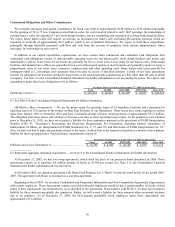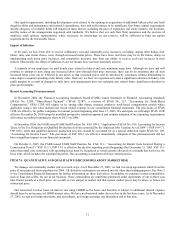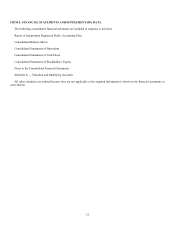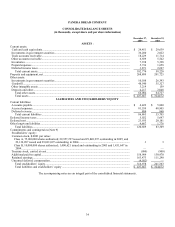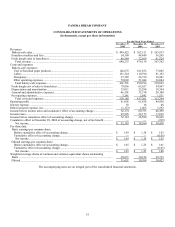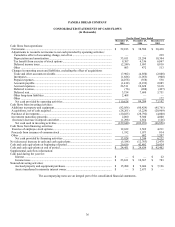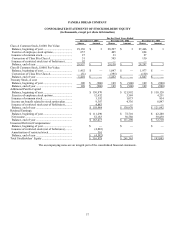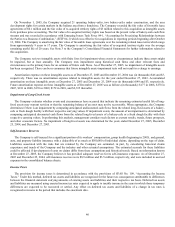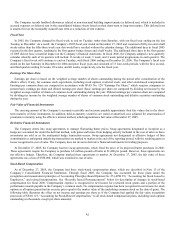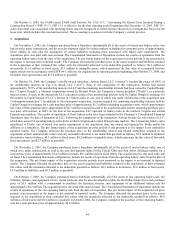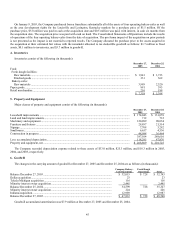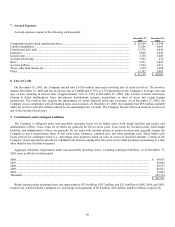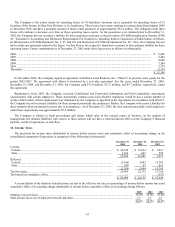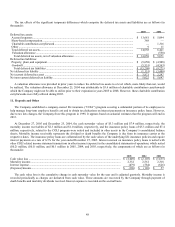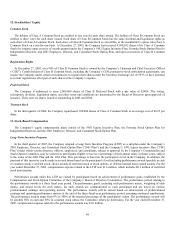Panera Bread 2005 Annual Report Download - page 45
Download and view the complete annual report
Please find page 45 of the 2005 Panera Bread annual report below. You can navigate through the pages in the report by either clicking on the pages listed below, or by using the keyword search tool below to find specific information within the annual report. 39
Trade and Other Accounts Receivable
Trade accounts receivable consists primarily of amounts due to the Company from its 41 franchise groups for purchases of fresh
dough from the Company’s fresh dough facilities and royalties due to the Company from franchisee sales. The Company does not
require collateral and maintains reserves for potential uncollectible accounts based on historical losses and existing economic
conditions, when relevant. The allowance for doubtful accounts at December 27, 2005 and December 25, 2004 was $0.03 million.
Other accounts receivable consists primarily of tenant allowances due from landlords.
Inventories
Inventories, which consist of food products, paper goods and supplies, and promotional items, are valued at the lower of cost or
market, determined under the first-in, first-out method.
Property and Equipment
Property, equipment, and leaseholds are stated at cost. Depreciation is provided using the straight-line method over the estimated
useful lives of the assets. Leasehold improvements are amortized using the straight-line method over the shorter of their estimated
useful lives or the related reasonably assured lease term. The estimated useful lives used for financial statement purposes are:
Leasehold improvements ...................................................................................................................................................... 15-20 years
Machinery and equipment .................................................................................................................................................... 5-10 years
Furniture and fixtures ........................................................................................................................................................... 3-7 years
External signage.................................................................................................................................................................... 6 years
Interest, to the extent it is incurred, is capitalized when incurred in connection with the construction of new locations or facilities.
The capitalized interest is recorded as part of the asset to which it relates and is amortized over the asset’s estimated useful life. No
interest was incurred for such purposes in 2005, 2004, or 2003.
Upon retirement or sale, the cost of assets disposed of and their related accumulated depreciation are removed from the accounts.
Any resulting gain or loss is credited or charged to operations. Maintenance and repairs are charged to expense when incurred, while
betterments are capitalized.
Goodwill
Goodwill consists of the excess of the purchase price over the fair value of net assets acquired from the acquisitions of the Saint
Louis Bread Company, franchise-operated bakery-cafes, a franchise-operated fresh dough facility, and the membership interest of a
former minority interest owner. In accordance with Statement of Financial Accounting Standards (SFAS) No. 141 (“SFAS 141”),
“Business Combinations,” and SFAS No. 142, “Goodwill and Other Intangible Assets,” the Company did not amortize any of the
goodwill related to acquisitions subsequent to June 30, 2001 and stopped amortizing all goodwill effective December 30, 2001. SFAS
142 requires goodwill and indefinite-lived intangible assets recorded in the financial statements to be evaluated for impairment
annually or when events or circumstances occur indicating that goodwill might be impaired. When appropriate, the Company
performs its impairment assessment by comparing discounted cash flows from acquired businesses with the carrying value of the
underlying net assets inclusive of goodwill. The Company completed annual impairment tests as of the first day of the fourth quarter
of fiscal years 2005, 2004, and 2003, none of which identified any impairment.
Other Intangible Assets
On October 30, 2004, the Company’s wholly-owned subsidiary, Artisan Bread, LLC, became the owner of 100% of the
membership interest in Cap City Bread, LLC. The Company recorded the fair value of favorable lease agreements of $0.2 million
related to this acquisition as an intangible asset in its purchase price accounting. The Company is amortizing this intangible asset over
the remaining related lease terms which range from approximately 5 years to 10 years. See Note 3 to the Company’s Consolidated
Financial Statements for further information related to this acquisition.



